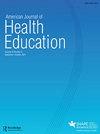Caregivers’ Reports of the Complex Impacts of the Pandemic on Family Food and Physical Activity Behaviors by Race, Ethnicity, Urbanicity, and Income
IF 0.8
Q4 PUBLIC, ENVIRONMENTAL & OCCUPATIONAL HEALTH
引用次数: 0
Abstract
ABSTRACT Background The COVID-19 pandemic affected health and well-being worldwide, but little is known about how the pandemic specifically impacted families with young children. Evidence suggests a relationship between well-being and health behaviors (diet, physical activity) and that preexisting health disparities were exacerbated during the pandemic. Purpose This project sought caregiver perspectives on pandemic impacts, overall and by race, ethnicity, urbanicity, and household income. Methods Caregivers of 4- to 11-year-olds were randomly selected to complete a mixed-mode survey in the winter of 2021–22 to evaluate ongoing community health education and programming. Qualitative content analysis of open-ended survey responses was conducted. Data were analyzed blind to demographic characteristics; later, differences by population were explored. Results Survey analysis (n = 1,429, response rate 27%) identified positive and negative impacts of the pandemic on youth diet and physical activity. Caregivers, unprompted, provided responses about the interconnected impacts on mental and physical health and health behaviors. Pandemic stress was described, including reduced energy, social isolation, and “fear of spread.” Significant differences by key characteristics were found. Discussion These findings reflect patterns that could underlie growing disparities. Translation to Health Education Practice: This work provides context for designing interventions that equitably promote healthy behaviors for young families.根据种族、民族、城市和收入,看护者报告大流行对家庭食物和身体活动行为的复杂影响
背景2019冠状病毒病大流行影响了全世界的健康和福祉,但人们对这场大流行如何特别影响有幼儿的家庭知之甚少。有证据表明,福祉与健康行为(饮食、身体活动)之间存在关系,而先前存在的健康差距在大流行期间进一步加剧。目的:本项目从总体和按种族、民族、城市化和家庭收入分类的角度,寻求护理人员对大流行影响的看法。方法在2021 - 2022年冬季,随机抽取4 ~ 11岁儿童的照顾者完成一项混合模式调查,评估正在进行的社区健康教育和规划。对开放式问卷调查结果进行定性内容分析。不考虑人口统计学特征对数据进行分析;后来,人们又研究了不同人群之间的差异。结果调查分析(n = 1429,回复率27%)确定了疫情对青少年饮食和身体活动的积极和消极影响。照护者在没有提示的情况下,就对身心健康和健康行为的相互影响提供了回应。他们描述了流行病的压力,包括精力减少、社会隔离和“对传播的恐惧”。在关键特征方面存在显著差异。这些发现反映了可能导致差距扩大的模式。翻译到健康教育实践:这项工作为设计干预措施提供了背景,公平地促进年轻家庭的健康行为。
本文章由计算机程序翻译,如有差异,请以英文原文为准。
求助全文
约1分钟内获得全文
求助全文
来源期刊

American Journal of Health Education
PUBLIC, ENVIRONMENTAL & OCCUPATIONAL HEALTH-
CiteScore
1.70
自引率
10.00%
发文量
36
期刊介绍:
AJHE is sponsored by the American Association for Health Education of the American Alliance for Health, Physical Education, Recreation and Dance. The mission of the American Association for Health Education(AAHE) is to advance the profession by serving health educators and others who strive to promote the health of all people through education and other systematic strategies.AAHE addresses the following priorities •Develop and promulgate standards, resources and services regarding health education to professionals and non-professionals •Foster the development of national research priorities in health education and promotion. Provide mechanisms for the translation and interaction between theory, research and practice.
 求助内容:
求助内容: 应助结果提醒方式:
应助结果提醒方式:


